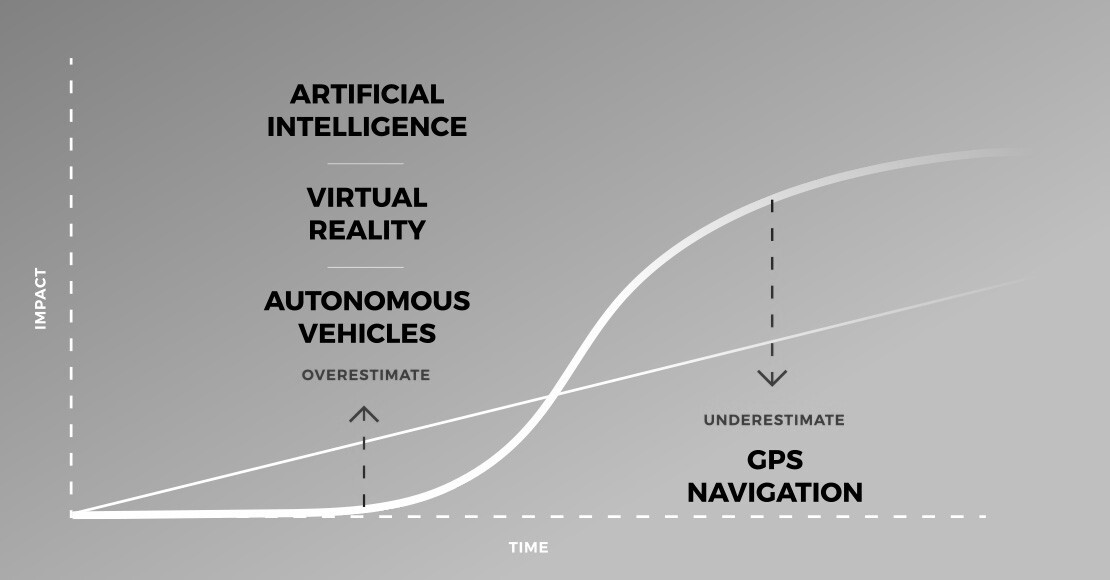Introduction
In the realm of decision-making, perception plays a pivotal role in shaping our judgments and choices. One mental model that sheds light on this phenomenon is Amara’s Law. Coined by futurist Roy Amara, this principle suggests that we tend to overestimate the short-term impact of technological advancements while underestimating their long-term implications. Understanding Amara’s Law can help us navigate decision-making processes with greater foresight and avoid the pitfalls of short-sightedness.
Anchoring in Human Psychology and Day-to-Day Life
Amara’s Law is deeply rooted in human psychology, particularly our cognitive biases and heuristics. Our brains are wired to focus on immediate results and underestimate the gradual and exponential effects of change. This cognitive bias, known as the “impact bias,” leads us to prioritize short-term gains and overlook the long-term consequences of our decisions. The prevalence of Amara’s Law is evident in various aspects of our lives, from personal choices to business strategies and public policy-making.
Examples of Amara’s Law in Different Contexts
Personal Life: Consider the adoption of new technologies in our daily routines. We often eagerly embrace the latest gadgets or apps, expecting immediate and transformative benefits. However, the long-term impact of these technologies, such as their effects on our attention span, social interactions, and mental well-being, may be underestimated. By succumbing to Amara’s Law, we may overlook the potential downsides and make decisions that compromise our long-term happiness and well-being.
Business Scenarios: Companies frequently face the temptation to adopt the latest trends and technologies to gain a competitive edge. However, hastily implementing new systems without fully understanding their long-term implications can lead to unforeseen challenges. For instance, organizations that rush to adopt automation without considering the impact on their workforce may experience decreased employee morale, loss of valuable skills, and lower productivity. By disregarding Amara’s Law, businesses risk making decisions that undermine their long-term sustainability.
Public Policy-Making: Governments often grapple with the task of regulating emerging industries and technologies. When crafting policies, decision-makers may be swayed by the immediate benefits presented by these innovations while underestimating the potential risks and long-term consequences. For example, lenient regulations on data privacy and security in the early days of the internet have led to significant challenges in protecting individuals’ personal information. By neglecting Amara’s Law, policymakers can inadvertently create loopholes that compromise public safety and privacy.
Mental Biases and Psychological Underpinnings
Several cognitive biases contribute to the occurrence of Amara’s Law. Anchoring bias leads us to rely heavily on initial information and fail to update our beliefs as new evidence emerges. Confirmation bias causes us to seek information that supports our preconceived notions and ignore evidence to the contrary. The optimism bias leads us to be overly optimistic about future outcomes, reinforcing our tendency to overestimate short-term benefits while downplaying long-term risks. These biases interact with Amara’s Law, reinforcing our inclination to make decisions based on immediate gains rather than long-term consequences.
Avoiding the Traps of Amara’s Law
To avoid succumbing to Amara’s Law, it is crucial to develop awareness and adopt strategies for more objective decision-making. First, cultivating a habit of critical thinking and questioning assumptions can help uncover potential long-term effects. Seeking diverse perspectives and considering alternative scenarios can challenge our biases and provide a more balanced view of the future. Additionally, conducting thorough research, gathering data, and engaging in scenario planning can help anticipate long-term implications and avoid hasty judgments based on short-term gains.
Implications of Amara’s Law and the Value of Awareness:
Understanding Amara’s Law empowers individuals and organizations to make more informed decisions. By recognizing our biases and the potential consequences of short-sighted thinking, we can prioritize long-term benefits over immediate gratification. Moreover, awareness of Amara’s Law encourages us to embrace a mindset of continuous learning and adaptability, allowing us to navigate the ever-evolving landscape of technology and innovation more effectively.
Conclusion
Amara’s Law serves as a valuable mental model in decision-making processes, reminding us of the importance of considering both short-term gains and long-term implications. By recognizing our biases, exploring diverse perspectives, and engaging in critical thinking, we can overcome the traps of Amara’s Law and make decisions that align with our long-term goals and values. Embracing the wisdom of Amara’s Law fosters a more balanced approach to decision-making and enhances our ability to navigate the complexities of an ever-changing world.
